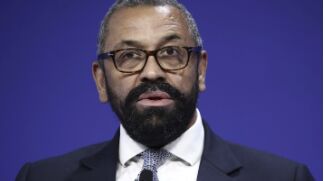Bridging the Divide: British Foreign Secretary Confronts China's Human Rights Crisis and Pursues Cooperation in Landmark Visit
British Foreign Secretary James Cleverly is visiting China to address concerns over issues including human rights abuses and security ties. The visit aims to strengthen communication and explore areas of cooperation while navigating the Conservative party's divided stance on China.
Cleverly's visit comes as China-Britain relations have reached their lowest point in decades due to disagreements on various sensitive issues. These include Beijing's curbing of civil liberties in Hong Kong, allegations of human rights abuses against the Uyghur minority in Xinjiang, China's support for Russia, and Britain's close security ties with the United States. During his visit, the British foreign secretary plans to address these concerns with the Chinese government. He will emphasize that China, as a global player, has a responsibility to fulfill its international commitments and obligations. This includes actively contributing to resolving conflicts such as Russia's invasion of Ukraine and diffusing geopolitical tensions in the South China Sea.
However, Britain's governing Conservative party is divided on how tough a stance to take with Beijing. Former Prime Minister Boris Johnson was accused of prioritizing trade ties and underestimating Chinese threats to national security. Current Prime Minister Rishi Sunak, on the other hand, aims to pursue a nuanced and non-confrontational approach. While acknowledging China as a growing challenge to Britain's values and interests, Sunak also recognizes the importance of maintaining a relationship with the Asian superpower. Critics of the current approach, such as Conservative lawmaker Iain Duncan Smith, argue that it risks appeasing China for economic gain.
Smith is one of five British members of Parliament who have been sanctioned by China, barring them from entering the mainland, Hong Kong, and Macau, as well as doing business with Chinese citizens. Cleverly intends to request the lifting of these sanctions during his visit. In addition to addressing human rights and security concerns, he also aims to explore potential areas of cooperation with China, such as climate change and trade. The trip is seen as an opportunity to strengthen channels of communication and protect British interests.
Originally scheduled for July, Cleverly's visit was postponed, and his then-counterpart, Qin Gang, was later replaced by veteran diplomat Wang Yi. Sacha Deshmukh, Amnesty International UK's chief executive, stressed the importance of human rights being at the forefront of Cleverly's agenda during his time in China. Deshmukh called for tangible actions beyond closed-door discussions on human rights issues. As Cleverly embarks on this trip, both countries hope to find common ground, deepen exchanges, and promote the stable development of Sino-British relations.




